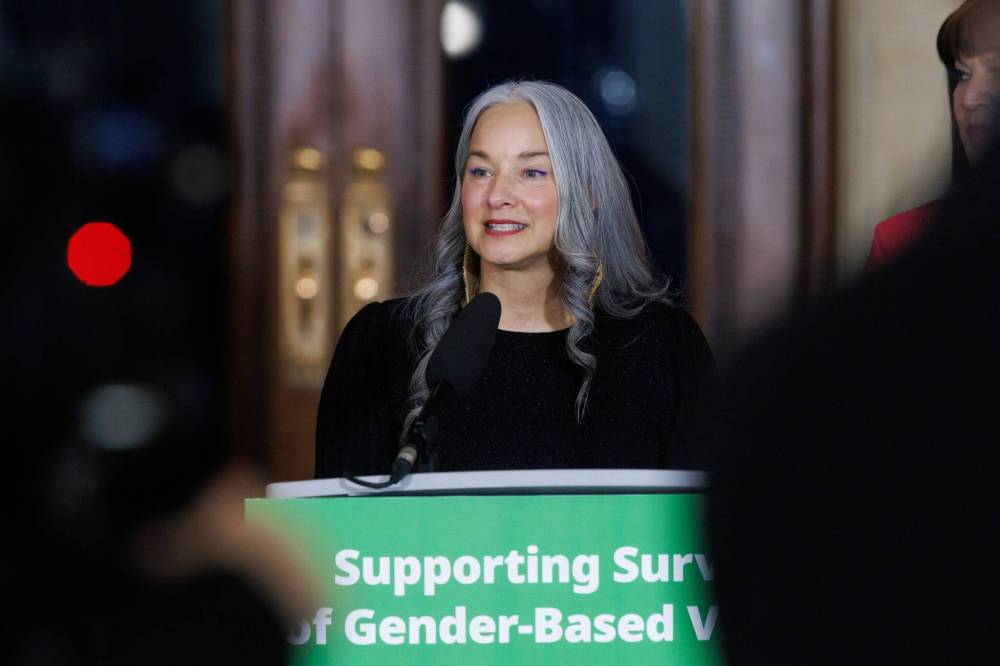Critics and foster parents called on the provincial government Monday to explain why it hasn’t budgeted any new money for Child and Family Services when the system is in “crisis.”
“We continue to hear horrific stories of children in care falling through the cracks,” said Liberal MLA Cindy Lamoureux who, during question period, asked the NDP government how much of the funding provided to CFS authorities in this year’s budget is new money.
The 2024 spending estimates show grants to CFS authorities are frozen at $358 million, as is financial assistance to CFS authorities at $43.4 million. The $116-million budget for child protection decreased by nearly $100,000 from last year.

MIKAELA MACKENZIE / FREE PRESS FILES
Liberal MLA Cindy Lamoureux, during question period, asked the NDP government how much of the funding provided to CFS authorities in this year’s budget is new money.
“While the budget makes some big claims about child-welfare investments, we’re not seeing any of it in the budget expenditures,” the interim Liberal Leader told the house.
Families Minister Nahanni Fontaine said the government isn’t taking any money out of the system. “In fact, we are investing over $420 million to CFS authorities and to their agencies.”
When asked for clarification, a member of Fontaine’s staff later said the amount is $433 million — including $75.5 million in financial assistance for child protection (a decrease from $75.7 million in 2023) and $358 million in grants to CFS authorities (the same as last year).
“We are continuing to evaluate and adjust funding allocations to be able support Indigenous jurisdiction” Fontaine said.
Federal Bill C-92 came into force four years ago, and recognizes the inherent right of First Nations, Inuit and Métis to develop their own Child and Family Services legislation. It is expected over time to reduce the reliance on provincially funded foster care providers.
The provincial budget for the Indigenous jurisdiction transition office — responsible for areas related to federal legislation and adapting the child welfare system to services delivered under Indigenous law — increased to $917,000 from $866,000.
Fontaine said the government’s priority is to see children in care “cared for by their families, by their communities and in their communities. That’s the work we’re doing to decolonize the system” while ensuring national standards are met, she said in the house.
“We have gone the longest without an increase in financial support, have the lowest basic maintenance rates, and are one of the only jurisdictions in the world who do not have a pre-service training program.”–Foster parent association president Jamie Pfau
Problems have been “rising to the surface” in news reports about youth in care being involved in violent crime, Lamoureux said in an interview. Winnipeg Police Chief Danny Smyth raised the alarm last month following a spate of machete attacks involving unsupervised youth. Those concerns were echoed by the Manitoba Advocate for Children and Youth and the Assembly of Manitoba Chiefs.
“Right now, there are a lot of placements — groups homes and foster parents — where those who are caring for children in care don’t have qualifications they should have, making them arguably unsafe placements,” Lamoureux said. “There’s no denying it, and we’ve yet to see any tangible forms of help or assistance.”
Fontaine said in an interview the government wants to “give flexibility to the authorities to support the sacred care of children, which includes stranger-based care and customary and kinship-based care.”
She said she expects to have more details in the coming weeks.
“Ultimately, it’s the authorities that will determine and have the flexibility on how to best support children in care.”
Meanwhile, Manitoba foster parents say the child-welfare system is “crumbling” and doesn’t come close to meeting the needs of children in care.
“We have gone the longest without an increase in financial support, have the lowest basic maintenance rates, and are one of the only jurisdictions in the world who do not have a pre-service training program,” association president Jamie Pfau said Monday.

MIKE DEAL / FREE PRESS FILES
Families Minister Nahanni Fontaine said the government isn’t taking any money out of the system.
Basic maintenance rates in Manitoba, which help cover expenses such as food and clothing, haven’t increased since 2012, the association says. The rates are about $22 to $32 per child per day, depending on age and geographic location.
The association has long advocated for adequate training, funding and supports for families.
“The mass consensus among child-welfare professionals, including previous and current children in care, birth families, foster parents, Indigenous community and advocacy groups, social workers, supervisors, policy makers, police and justice systems — and academic researchers — is that our system is in crisis,” said Pfau.
carol.sanders@freepress.mb.ca

Carol Sanders
Legislature reporter
After 20 years of reporting on the growing diversity of people calling Manitoba home, Carol moved to the legislature bureau in early 2020.